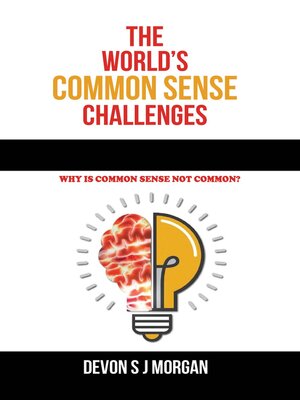
Sign up to save your library
With an OverDrive account, you can save your favorite libraries for at-a-glance information about availability. Find out more about OverDrive accounts.
Find this title in Libby, the library reading app by OverDrive.



Search for a digital library with this title
Title found at these libraries:
| Library Name | Distance |
|---|---|
| Loading... |
Common sense has a formula rooted in logical thinking. An example of this formula is: All men are mortal, John is a man, therefore John is mortal. When applied with accurate information, this formula can help solve any problem and lead to the correct conclusion. Common sense isn't truly common because it is developed through expanding our understanding of life and people. Sadly, most of us lack a strong interest in studying life and others because we are busy attending to our own affairs.
So, why is it called common sense if it's not really common? At some point in human development, we recognised the need for a consistent (standard) way of reaching the right conclusion, and we decided that the logical application of knowledge is the most dependable approach rather than being guided by our emotions. Our minds need to be developed so that they can correctly interpret and understand shared information and activities that are common to nearly all people.
Common sense is applied to offer better solutions to eleven critical life issues discussed in this work. Starting with the history, development, and origins of common sense, it is then applied to essential life areas: childbirth and nurturing children; health and nutrition; pharmaceutical medicines and the medical system; old age, culture, and lasting happiness; caring for Mother Earth, the environment, and our food; money, teamwork, and success; sex and relationships; women's rights and sexism; education; politics, including government, economic policies, the role of the media, and how to choose politicians; and the consequences of the illegality and criminalisation of drugs.







